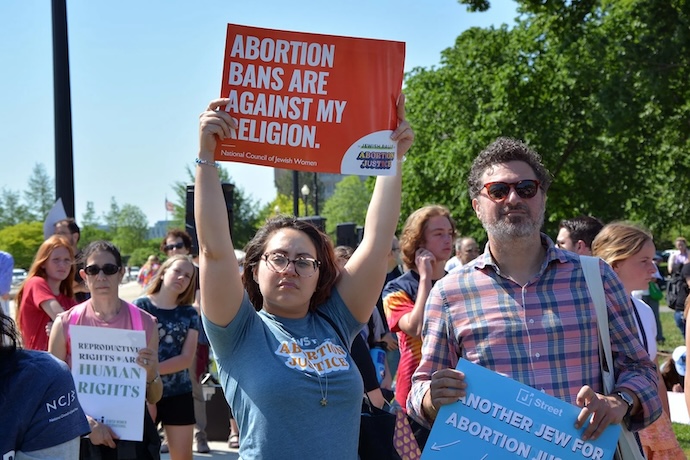Iowa’s 6-week abortion ban went into effect last month, meaning that more than 600,000 women of reproductive age now lack access to legal abortion in the state. While the law claims to offer exceptions for medical emergencies, rape, incest, and fatal fetal anomalies, these exceptions are so vaguely written they’ll be virtually impossible to access.
A Planned Parenthood-led lawsuit successfully blocked the law’s implementation since Iowa’s Republican-controlled legislature approved the ban over a year ago, but the state’s Supreme Court ended the reprieve in June by overturning the lower court’s injunction. In doing so, the Iowa Supreme Court also nullified a 2018 decision that recognized abortion as a fundamental right under the state’s Constitution—an essential component of “ordered liberty.” However, with new personnel and a green light from the US Supreme Court, that liberty has been wiped out.
Planned Parenthood has dropped that particular lawsuit, but there may be another path forward for advocates of reproductive rights. In her dissenting opinion, Iowa’s Chief Justice Susan Christensen pointed to the state’s new Religious Freedom Restoration Act (RFRA) and highlighted a recent Indiana case where the Court of Appeals held that a similar abortion law violated the religious freedom of those whose beliefs compel them to end a pregnancy.
This legal theory isn’t particularly novel; applying RFRA to abortions motivated by religious beliefs is straightforward. Under RFRA, religious believers are entitled to exemptions from laws that substantially burden their “sincere religious exercise” unless the state can demonstrate that the burden is the “least restrictive means” of achieving a compelling government interest.
The challenge for states that outlaw abortion is that they typically allow exceptions in cases of rape, incest, fetal abnormalities, and medical emergencies. When secular exceptions exist, Supreme Court precedent (established, notably, by Republican Justices) generally compels states to also permit religious exceptions. After all, a religiously motivated abortion doesn’t undermine the state’s asserted interest in ‘fetal life’ any more than any other exceptions do. In every case, the result is the same—a termination of a pregnancy.
The law is so clear-cut that anti-abortion activists and states cannot mount good-faith legal arguments in opposition. Instead, they attack the plaintiffs’ beliefs, claiming they aren’t genuinely religious. This tactic rests on lazy assumptions that religion is intrinsically anti-abortion and bears no relationship to the lived experiences of religious people who have abortions. What it does offer, however, is a reminder that religious peoples’ accounts of abortion are largely absent from political and legal discourse.
My organization, the Law, Rights and Religion Project at Columbia Law School, recently filed an amicus brief in the Indiana case mentioned by Judge Christensen to correct this record. Drawing on data collected by the Abortion & Religion Project and first-hand testimony, we demonstrated the many ways that religious beliefs can motivate abortion. In their own words, individuals described the religious and spiritual reasoning behind their abortion decisions.
Some consulted religious doctrine or faith leaders. For others, their abortions were motivated by religious obligations they feel bound by, such as the duties one owes to others, including future and existing children. One of the women interviewed, a Christian, pregnant by an abusive partner, described how she made her abortion decision through “[a] lot of praying, a lot of talking to God.” She concluded that God “would not want me to be in a situation for the rest of my life or [for] a child to be in a situation for the rest of its life to be tortured by somebody.”
A Catholic woman with two children who terminated a medically threatening pregnancy explained, “I prayed on it, and honestly, my solution at that point was not to let my children lose their mother.” Others described being guided by religious obligations to oneself. A seminary student in New York explained that her abortion was inspired by her belief that “if it is not the right time or the right circumstance to have a baby, a pregnant person has the inherent spiritual authority not to call that particular future into being.
Religious freedom law protects religious practices regardless of whether they’re mandatory in any religious tradition or derive from formal religious doctrine. After all, no religious text prohibits adherents from providing contraception in a healthcare insurance plan for employees. As such, while Jewish plaintiffs have been at the forefront of challenging abortion restrictions on religious freedom grounds—assuming a significant burden in doing so—a religious right to abortion isn’t limited to those who can point to Jewish law, or halakha, in their claims. As our brief illustrates, a wide range of religious beliefs can motivate individuals to seek abortions. In such cases, abortion is a sincere expression of religious commitment, deserving of protection under religious freedom law.
Religious exemptions from abortion bans offer relief to only a limited number of individuals and can never be a comprehensive legal solution to the country’s reproductive health crisis. Nor should the right to control one’s body depend on proof of one’s religious commitments; reproductive freedom is a right that depends on one’s humanity, not one’s religious beliefs.
That said, attacking the status quo incrementally proved to be a winning strategy for the anti-abortion movement. And forcing that movement to occupy a defensive posture neutralizes the legal force it’s exerted since Dobbs. Most importantly, people motivated by religious beliefs to have, assist, or provide abortions deserve the same constitutional protections as those afforded to conservative Christians. As abortion rights defenders in Iowa and elsewhere navigate an increasingly restrictive legislative environment, RFRA challenges are only likely to increase—and they have the critical benefit of elevating the abortion stories of religious people.


